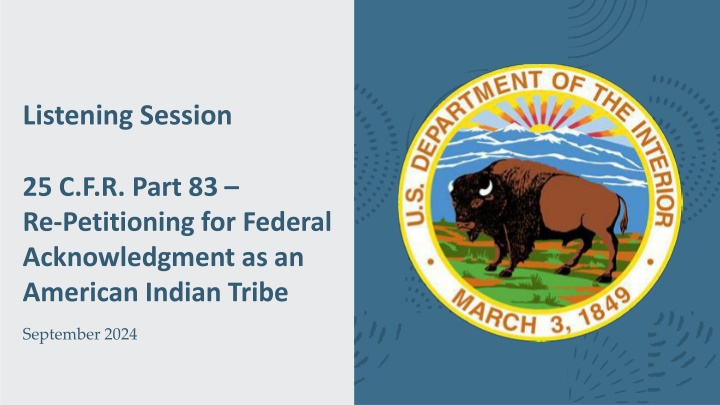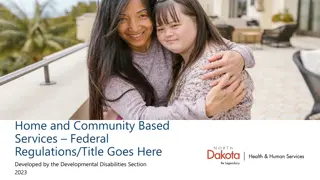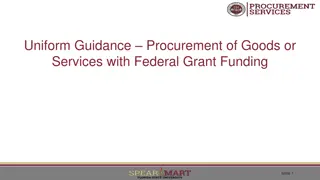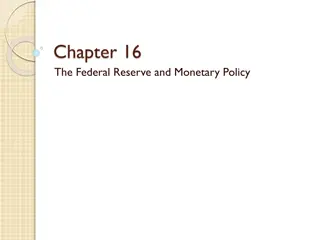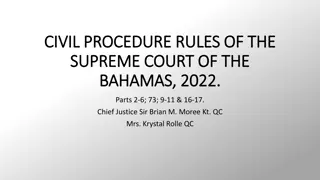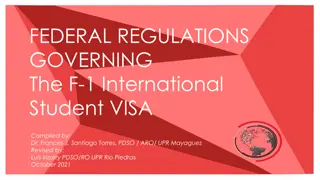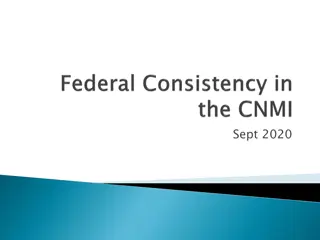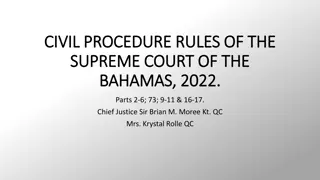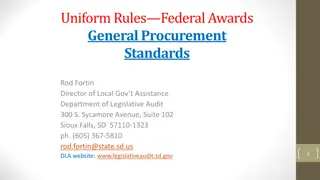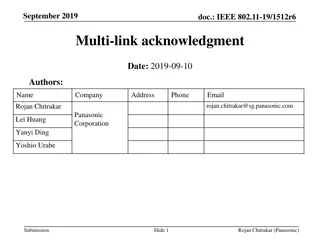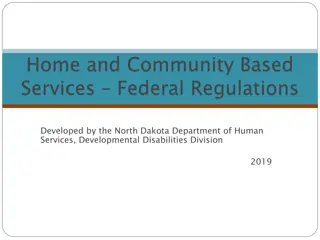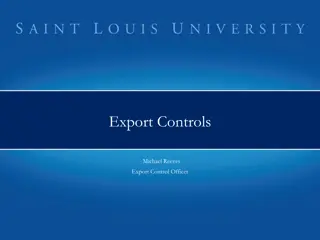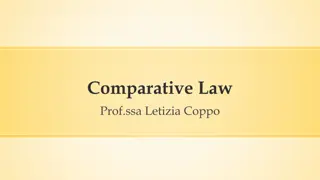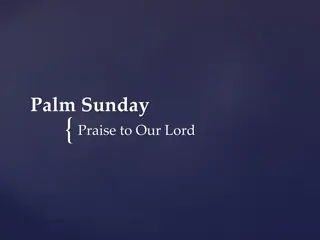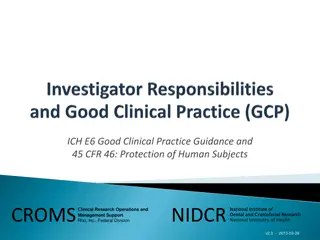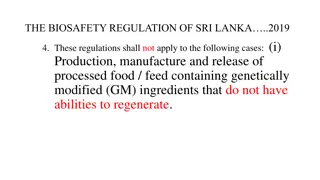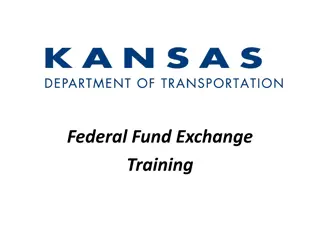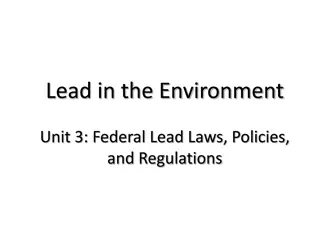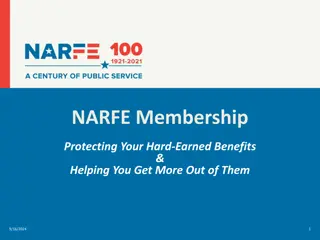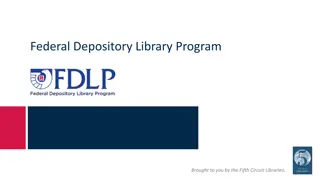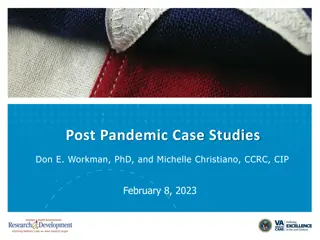Federal Acknowledgment Regulations Overview
Background information on the Federal Acknowledgment Regulations outlined in 25 C.F.R. Part 83, including the process, criteria, and implications of seeking federal acknowledgment as an American Indian Tribe. Learn about the re-petitioning ban, mandatory criteria, and the importance of federal acknowledgment for tribal groups.
Download Presentation

Please find below an Image/Link to download the presentation.
The content on the website is provided AS IS for your information and personal use only. It may not be sold, licensed, or shared on other websites without obtaining consent from the author.If you encounter any issues during the download, it is possible that the publisher has removed the file from their server.
You are allowed to download the files provided on this website for personal or commercial use, subject to the condition that they are used lawfully. All files are the property of their respective owners.
The content on the website is provided AS IS for your information and personal use only. It may not be sold, licensed, or shared on other websites without obtaining consent from the author.
E N D
Presentation Transcript
Listening Session 25 C.F.R. Part 83 Re-Petitioning for Federal Acknowledgment as an American Indian Tribe September 2024
Listening Session This listening session is only open to Present, Former, and Prospective Petitioners. This listening session is closed to public and the press to protect confidential information. Court reporter will create a transcript to ensure all comments are accurately captured for Interior to respond to. During today s session, we will ask designated representatives of Petitioners to provide comments. When commenting, please begin with your name, title, and group affiliation for the court reporter.
Department Officials Bryan Newland, Assistant Secretary for Indian Affairs Kathryn Isom-Clause, Deputy Assistant Secretary for Policy & Economic Development Stephanie Sfiridis, Senior Counselor. Office of Assistant Secretary for Indian Affairs K. Denise Litz, Acting Director, Office of Federal Acknowledgment Sam Ennis, Assistant Solicitor, Tribal Government Services, Office of the Solicitor John-Michael Partesotti, Attorney-Advisor, Tribal Government Services, Office of the Solicitor
Contents Background on Interior s Federal Acknowledgment Regulations (25 C.F.R. Part 83). The seven mandatory criteria ( 83.11(a) (g)) The ban on re-petitioning ( 83.4(d)) Chinook and Burt Lake decisions. Reconsideration of the Ban. Justifications for a Limited Exception to the Ban. Proposed Re-petition Authorization Process.
Background In 1978, Interior first promulgated regulations (now located at 25 C.F.R. Part 83) creating the process through which groups can petition to become acknowledged as Indian Tribes. Interior subsequently amended Part 83 in 1994 and then again in 2015. Federal acknowledgment results in placement on the List of federally recognized Indian Tribes, establishment of a government-to-government relationship with the United States, and eligibility for services and programs available to Indian Tribes, among other benefits.
Background on Mandatory Criteria Seven mandatory criteria for Federal acknowledgment 25 U.S.C. 83.11: (a) Indian Entity Identification (b) Community (c) Political Authority (d) Governing Document (e) Descent from Historical Indian Tribe (f) Unique Membership (g) Congressional Termination
Background on Re-Petition Ban Part 83 s re-petition ban Since 1994, Part 83 has expressly banned re-petitioning. In 2014, Interior published a proposed rule (79 FR 30766) that would have allowed limited re-petitioning. In the 2015 final rule revising Part 83 (80 FR 37862), Interior retained the ban, reasoning that re-petitioning would: o Undermine consistency with Interior s previous determinations. o Be unfair to petitioners that have not yet been reviewed. o Hinder the goals of increasing efficiency and timeliness by imposing additional workload on Interior.
Chinook and Burt Lake Decisions Following the 2015 revision of Part 83, two petitioners denied Federal Acknowledgment the Chinook Indian Nation and the Burt Lake Band of Ottawa and Chippewa Indians challenged Interior s decision not to allow re-petitioning in Federal district court. In 2020, the courts in Chinook (W.D. Wash) and Burt Lake (D.D.C) sided with the petitioners, holding that Interior s justifications for the re- petition ban, as stated in the 2015 final rule, were arbitrary and capricious in violation of the APA. In lieu of striking down the ban, the courts remanded the ban to Interior to consider it.
Reconsideration of the Ban Timeline January 10, 2020: Chinook decision issued. March 25, 2020: Burt Lake decision issued. December 18, 2020: Interior announced its intent to reconsider the ban and solicited written comments. February 25, 2021: Interior held a consultation with federally recognized Indian Tribes. March 31, 2021: The comment period on the ban closed. Following the comment period, Interior considered three options: (1) retaining the ban (albeit with revised justifications); (2) allowing limited re- petitioning, or (3) allow open-ended re-petitioning. In the 2022 proposed rule (87 FR 24908), Interior proposed the first option.
2022 Proposed Rule The 2022 proposed rule justified retaining the ban based on the following arguments: (1) Interior s previous negative determinations are substantively sound. (2) Denied petitioners received due process. (3) The revisions to Part 83 in the 2015 final rule are not significant enough to justify re-petitioning. (4) Third parties and Interior have legitimate interest in the finality of Interior s final determinations.
Further Reconsideration of the Ban Timeline (cont.) April 27, 2022: Interior published the 2022 proposed rule. June 2 & 6, 2022: Interior held consultations with federally recognized Indian Tribes. June 9, 2022: Interior held a listening session with present, former, and prospective petitioners. July 6, 2022: The comment period on the 2022 proposed rule closed. Following the comment period, Interior again considered three options: (1) retaining the ban; (2) allowing limited re-petitioning, or (3) allowing open-ended re-petitioning. Interior has now proposed the second option.
Justification for Limited Re-Petitioning Fairness to unsuccessful petitioners. Responsiveness to the Chinook and Burk Lake decisions. Advancements in technology. Protection from wide-ranging re-litigation of previously decided issues. Recognition of third-party and Departmental interest in finality.
Re-Petition Authorization Process The new proposed rule would append a new subpart to the end of Part 83, conditioning re-petitioning on a threshold review. To re-petition, a prospective re-petitioner would first have to plausibly allege that Interior s previous, negative determination would change to positive on reconsideration, based on one or both of the following (25 C.F.R. 83.48(a)): (1) a change in Part 83 (from a previous version to the current version); and/or (2) new evidence.
Re-Petition Authorization Process (cont.) Unsuccessful petitioners would have five years to submit a re-petition request. 25 C.F.R. 83.49. The clock would begin to run on either: (1) the effective date of the final rule implementing the new process: or (2) the date of issuance of the petitioner s negative final determination, whichever is later. The clock would be tolled during any period of judicial review of the negative final determination. A petitioner denied authorization to re-petition would not be allowed to submit a new request, unless Interior revises Part 83 again in the future. 25 C.F.R. 83.47(c), 83.48(b).
Re-Petition Authorization Process (cont.) Sections 83.50-83.61 describe the procedure that Interior would apply to a re-petition request. The procedure would mirror that for processing a documented petition and would include: Publication of notice in the Federal Register. Posting of certain portions of the petitioner s submission on the Office of Federal Acknowledgment s website. Notice to certain third parties. An opportunity for the public to comment on the request and for the petitioner to respond to any comments.
Re-Petition Authorization Process (cont.) The proposed rule clarifies how Interior would prioritize review of documented petitions and re-petition requests. 25 C.F.R. 83.53. Petitions already under review would receive highest priority, followed by petitions awaiting review. New petitions would have priority over re-petition request, at least initially. OFA would maintain a list of re-petition requests ready for active consideration. Any re-petition request pending on the list for more than two years would have priority over any subsequent filed petition.
Re-Petition Authorization Process (cont.) Within 180 days of the date on which OFA notifies the petitioner that AS-IA has begun review, AS-IA would issue a decision on the re- petition request. 25 C.F.R. 83.57. AS-IA would grant authorization to re-petition if AS-IA finds that the petitioner meets the conditions of 83.47 through 83.49. A decision granting authorization to re-petition would not be a final agency action. Rather, it would allow the petitioner to submit a new documentation petition. A decision denying authorization to re-petition would be a final agency action.
Miscellaneous Provision The proposed rule would give any petitioner currently proceeding under the previous version of Part 83 (promulgated in 1994) the choice to switch over to the 2015 version. 25 C.F.R. 83.47(b). This provision promotes efficiency. Absent this choice, the petitioners currently proceeding under the previous version of Part 83 would have to await a final determination and, in the event that the determination is negative, file a request to re-petition under the 2015 version.
Zoom Technical Guidance To enter the discussion, use the raise hand icon on the taskbar. If you are calling into the meeting using a phone, dial *9 on your keypad to raise your hand. Click the audio button in the bottom toolbar to mute yourself when not speaking. If you are calling into the meeting using a phone, dial *6 on your keypad to unmute yourself. Please direct any technical questions to the Host, using the chat function for assistance.
Comment Period During the comment period we will ask designated representatives of Petitioners to provide comments. Please state your name and affiliation for the court reporter. Any written comments must be submitted by email to consultation@bia.gov by 11:59 pm ET on Friday, September 13, 2024. Please include Part 83 in the subject line and submit written comments as early as possible.
